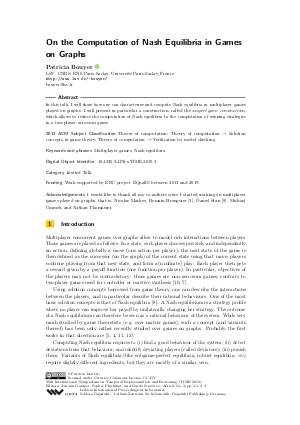On the Computation of Nash Equilibria in Games on Graphs (Invited Talk)
Author
Patricia Bouyer 
-
Part of:
Volume:
26th International Symposium on Temporal Representation and Reasoning (TIME 2019)
Part of: Series: Leibniz International Proceedings in Informatics (LIPIcs)
Part of: Conference: International Symposium on Temporal Representation and Reasoning (TIME) - License:
 Creative Commons Attribution 3.0 Unported license
Creative Commons Attribution 3.0 Unported license
- Publication Date: 2019-10-07
File

PDF
LIPIcs.TIME.2019.3.pdf
- Filesize: 362 kB
- 3 pages
Document Identifiers
Subject Classification
ACM Subject Classification
- Theory of computation
- Theory of computation → Solution concepts in game theory
- Theory of computation → Verification by model checking
Keywords
- Multiplayer games
- Nash equilibria
Metrics
- Access Statistics
-
Total Accesses (updated on a weekly basis)
0PDF Downloads0Metadata Views
Abstract
In this talk, I will show how one can characterize and compute Nash equilibria in multiplayer games played on graphs. I will present in particular a construction, called the suspect game construction, which allows to reduce the computation of Nash equilibria to the computation of winning strategies in a two-player zero-sum game.
Cite As Get BibTex
Patricia Bouyer. On the Computation of Nash Equilibria in Games on Graphs (Invited Talk). In 26th International Symposium on Temporal Representation and Reasoning (TIME 2019). Leibniz International Proceedings in Informatics (LIPIcs), Volume 147, pp. 3:1-3:3, Schloss Dagstuhl – Leibniz-Zentrum für Informatik (2019)
https://doi.org/10.4230/LIPIcs.TIME.2019.3
BibTex
@InProceedings{bouyer:LIPIcs.TIME.2019.3,
author = {Bouyer, Patricia},
title = {{On the Computation of Nash Equilibria in Games on Graphs}},
booktitle = {26th International Symposium on Temporal Representation and Reasoning (TIME 2019)},
pages = {3:1--3:3},
series = {Leibniz International Proceedings in Informatics (LIPIcs)},
ISBN = {978-3-95977-127-6},
ISSN = {1868-8969},
year = {2019},
volume = {147},
editor = {Gamper, Johann and Pinchinat, Sophie and Sciavicco, Guido},
publisher = {Schloss Dagstuhl -- Leibniz-Zentrum f{\"u}r Informatik},
address = {Dagstuhl, Germany},
URL = {https://drops.dagstuhl.de/entities/document/10.4230/LIPIcs.TIME.2019.3},
URN = {urn:nbn:de:0030-drops-113616},
doi = {10.4230/LIPIcs.TIME.2019.3},
annote = {Keywords: Multiplayer games, Nash equilibria}
}
Author Details
Funding
Work supported by ERC project EQualIS between 2013 and 2019.
Acknowledgements
I would like to thank all my co-authors since I started working on multiplayer games played on graphs, that is, Nicolas Markey, Romain Brenguier [Romain Brenguier, 2012], Daniel Stan [Stan, 2017], Michael Ummels and Nathan Thomasset.
References
-
Patricia Bouyer. A Note on Game Theory and Verification. In Proc. 17th International Symposium on Automated Technology for Verification and Analysis (ATVA'19), Lecture Notes in Computer Science. Springer, 2019. To appear.

-
Patricia Bouyer, Romain Brenguier, Nicolas Markey, and Michael Ummels. Pure Nash Equilibria in Concurrent Games. Logical Methods in Computer Science, 11(2:9), 2015.

-
Romain Brenguier. Nash Equilibria in Concurrent Games - Application to Timed Games. PhD thesis, ENS Cachan, France, 2012.

-
Krishnendu Chatterjee, Thomas A. Henzinger, and Marcin Jurdziński. Games with Secure Equilibria. Theoretical Computer Science, 365(1-2):67-82, 2006.

-
Krishnendu Chatterjee, Rupak Majumdar, and Marcin Jurdziński. On Nash Equilibria in Stochastic Games. In Proc. 18th International Workshop on Computer Science Logic (CSL'04), volume 3210 of Lecture Notes in Computer Science, pages 26-40. Springer, 2004.

-
Erich Grädel and Michael Ummels. Solution Concepts and Algorithms for Infinite Multiplayer Games. In New Perspectives on Games and Interaction, volume 4 of Texts in Logic and Games, pages 151-178. Amsterdam University Press, 2008.

-
Thomas A. Henzinger. Games in system design and verification. In Proc. 10th Conference on Theoretical Aspects of Rationality and Knowledge (TARK'05), pages 1-4, 2005.

-
John F. Nash. Equilibrium Points in n-Person Games. Proceedings of the National Academy of Sciences of the United States of America, 36(1):48-49, 1950.

-
Daniel Stan. Randomized Strategies in Concurrent Games. PhD thesis, Université Paris-Saclay, France, 2017.

-
Wolfgang Thomas. Infinite Games and Verification. In Proc. 14th International Conference on Computer Aided Verification (CAV'02), volume 2404 of Lecture Notes in Computer Science, pages 58-64. Springer, 2002. Invited Tutorial.

-
Michael Ummels. Rational Behaviour and Strategy Construction in Infinite Multiplayer Games. In Proc. 26th Conference on Foundations of Software Technology and Theoretical Computer Science (FSTTCS'06), volume 4337 of Lecture Notes in Computer Science, pages 212-223. Springer, 2006.

-
Michael Ummels. The Complexity of Nash Equilibria in Infinite Multiplayer Games. In Proc. 11th International Conference on Foundations of Software Science and Computation Structures (FoSSaCS'08), volume 4962 of Lecture Notes in Computer Science, pages 20-34. Springer, 2008.

-
Michael Ummels. Stochastic Multiplayer Games - Theory and Algorithms. PhD thesis, RWTH Aachen, Germany, 2010.

